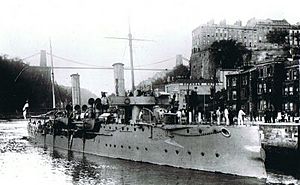HMS Antelope (1893) facts for kids

HMS Antelope in the River Avon, Bristol, circa 1908.
|
|
Quick facts for kids History |
|
|---|---|
| Name | HMS Antelope |
| Builder | Devonport Dockyard |
| Laid down | 21 October 1889 |
| Launched | 12 July 1893 |
| Commissioned | 18 July 1894 |
| Fate | Sold for breaking on 27 May 1919 |
| General characteristics | |
| Class and type | Alarm-class torpedo gunboat |
| Displacement | 810 tons |
| Length | 242 ft (74 m) |
| Beam | 27 ft (8.2 m) |
| Draught | 12 ft 6 in (3.81 m) maximum |
| Installed power | 3,500 ihp (2,600 kW) |
| Propulsion |
|
| Speed | 18.7 kn (34.6 km/h) |
| Complement | 91 |
| Armament |
|
HMS Antelope was a special type of small warship called a torpedo gunboat. She was built for the Royal Navy in the late 1800s. Launched in 1893, Antelope served for many years. She was first an active warship and later a training ship. The ship was sold for scrap in 1919.
Contents
What Was the Antelope Like?
The Alarm class ships, including Antelope, were designed by Sir William Henry White. They were about 242 ft (74 m) long. That's longer than two basketball courts! They were also 27 ft (8.2 m) wide. The ship weighed 810 tons.
Antelope had two powerful steam engines built by Yarrows. These engines, along with two special boilers, turned twin propellers. This setup gave her a speed of about 18.7 knots (34.6 km/h) (around 21.5 miles per hour). She could carry between 100 and 160 tons of coal. A crew of 91 sailors and officers worked on board.
What Weapons Did Antelope Carry?
When Antelope was first built, she had several weapons.
- Two QF 4.7-inch (12 cm) guns. These were powerful cannons.
- Four 3-pounder guns. These were smaller guns.
- One Gardner machine gun.
- Three 18-inch torpedo tubes. One was at the front (bow) of the ship. The other two were on deck and could turn. The ship also carried three extra torpedoes.
Antelope Through the Years
Building the Ship
Antelope started being built at Devonport Dockyard on October 21, 1889. There were some delays because of problems with the ship's propeller shafts.
She was finally launched on July 12, 1893. Miss Crocker, whose father managed the shipyard, officially launched the ship. Years later, in 2015, her grandson showed a special wooden box on a TV show. It held the mallet and chisel Miss Crocker used to cut the rope that held the ship. Antelope was finished in May 1894.
In August 1894, Antelope took part in naval exercises. These were like practice battles for the navy. She joined more exercises in July 1896.
On June 26, 1897, Antelope was part of a big Fleet Review at Spithead. This event celebrated Queen Victoria's 60 years as queen. Later that year, she joined more exercises with the Reserve Fleet.
In April 1899, Antelope was chosen to help train naval reserves. She supported a training ship called Daedalus in Bristol.
In June 1900, Antelope was ordered to be ready for more naval exercises. She joined 'Fleet B' for these practice battles. The next year, in July 1901, she took part in the 1901 exercises.
Commander Henry Arthur Phillips took command of the ship in May 1902. In July 1902, she rejoined the main navy squadrons. She was also part of a fleet review on August 16, 1902. This review was for the coronation of King Edward VII. Commander William Nicholson became her commander in September 1902.
By 1905, Antelope was considered less important for fighting. Her weapons were not removed, but she was not updated with new engines like some other ships. From 1910, Antelope was used for harbour service. This means she stayed in the port and was used as a training ship at Devonport.
In July 1914, she was listed for sale. But when World War I started, Antelope went back to training duties at Devonport. She was used to train stokers, who were the sailors who kept the ship's engines running.
End of Service
Antelope was sold on May 27, 1919. She was bought by T R Sales to be broken up for scrap.
Ship Numbers
| Pennant number | From |
|---|---|
| D25 | 1914 |
| N25 | September 1915 |

